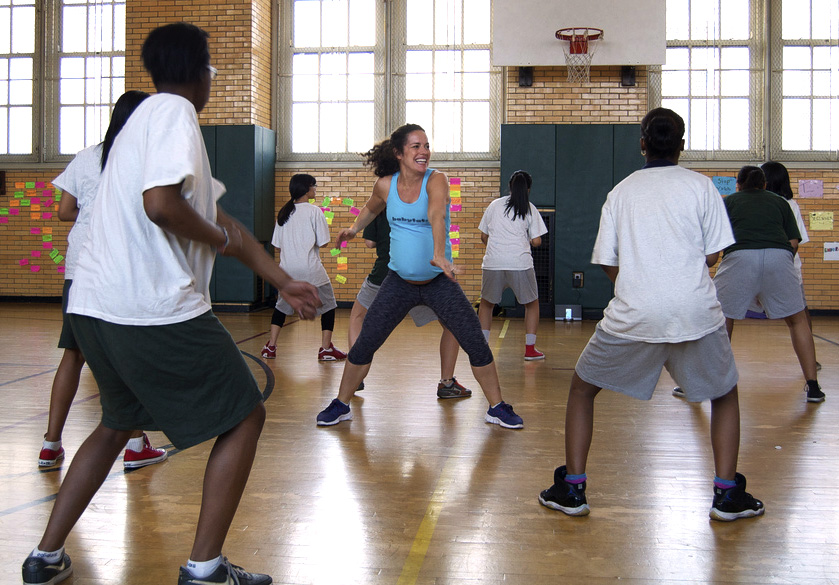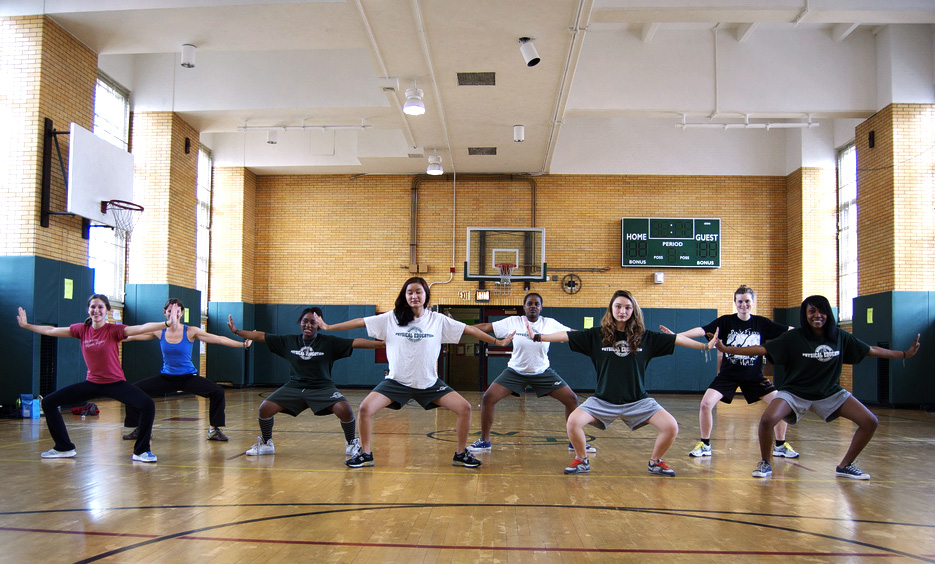Nutritional advice and intenSati
On a recent morning in a bright top floor high school gym in Washington Irving High School near Union Square, a radical experiment in health, fitness and youth self-affirmation was underway. Leading it, along with a team of four New School students, was an energetic, bouncy, vibrant Lang professor who wore a smile so large that her eyes occasionally had to squint just to make room for it.

Across the country, the state of student health in public schools nationwide has become a source of great academic debate, parental concern and municipal attention. New York City may be one of the first large cities in the country to actually reverse the obesity rate of children, but one New School professor, Natalia Mehlman Petrzela, an assistant professor and co-chair of education studies at Eugene Lang College, is determined to improve the physical state and attitudes of some of the city’s youngest residents.
Mehlman Petrzela has launched Health Class 2.0 — a program designed to educate students at local public schools about the importance of fitness and nutrition as well as self-confidence and self-affirmation. The program started in the fall of last year with two schools, one in Harlem and the other in the Village, and will be giving sessions at five more schools starting in the fall of 2012. Much of their success seems to come from this Lang professor who bursts with enthusiasm for the program.
The Washington Irving School Campus hosts three different high schools under a single roof, each occupying its own floors. Since the beginning of the semester Mehlmen Petrzela has been coming in most Tuesday mornings with a group of New School students to lead the unique health and fitness session during class.
“Essentially we go into P.E. class with a theme for the day that is beyond just physical wellness,” Mehlman Petrzela said. “Making choices, redefining fat, redefining love” are some of the chief goals of the sessions, she added.
Mehlman Petrzela is expecting her first child, but her pregnancy has not lessened her enthusiasm for this program, nor has it prevented her from participating in the sessions at the school.
The sessions she has devised comprise two parts. The first is a fitness component that involves cardio workouts and affirmations, what Mehlman Petrzela calls “intenSati.” IntenSati is in essence a series of exercises while the leader calls out phrases that the class chants back in unison.
According to the founder of intenSati’s website, it derives from the English word “intend” and the Pali word “Sati,” which is a language most associated with early Buddhist texts. The goal of this workout is to connect the body and mind through fitness by creating an atmosphere of encouragement, confidence, and enthusiasm.
The New School has long been known as a university that is engaged with the community at large. The New School has attempted to branch out in recent years through New School-led programs such as Health Class 2.0. The New School is not the only New York City university that has used its resources to bring expertise and students to engage and assist the community around it. According to New York University’s public service page, last year, members of their community “participated in over 1.4 million hours of service through a vast array of programs, locally, nationally and globally.”
Bill Pfeiffer, an official in the office of civic engagement at NYU, says that their university would even like to make civic engagement mandatory. He notes the university’s ties to JumpStart, a national program dedicated to working with young students who are at risk of dropping out early. These students are working mostly on the Lower East Side. Pratt, similarly, runs the America Reads program, a project that involves tutoring children from the communities surrounding their Brooklyn campus in both math and literacy.

In the session led by Mehlman Petrzela, the Washington Irving students chanted the self-affirming phrases for nearly 20 minutes. Mehlman Petrzela ran among the rows of girls, encouraging the ones who are not so into moving this early in the morning with a grand smile and bursts of excitement.
Asked about the techniques used by Mehlman Petrzela and her crew of mostly New School students, “I think it is very interesting, especially as far as nutrition is involved,” said Cheryl Lee, a physical education teacher at Washington Irving High School. “A lot of [students] don’t think about nutrition at all, and it really supplements our health program…” Lee paused as her girls came together in full unison to shout “PROVE IT!” in the final moment of the cardio workout, “which we don’t really have that much of in the building right now.”
IntenSati, which lasted for about 20 minutes, was followed by a food and nutrition component that is sponsored by the food company Blue Print Cleanse. During this time a nutritionist from the company, Julie Ruelle, talks to the girls as they cool down from their workout about a food habit topic that changes weekly, last week it was ingredients of the things you eat, this week it is about portion sizes. Blue Print snack bars and juices are also handed out, on the back it says that the bars are, “gluten free, wheat free, preservative free, additive free, vegan and kosher”
“You are choosing what to eat, not having someone else choose for you,” says Ruelle referring to the portions that they should think about every meal. The girls, most of them without the expression of utter distaste on their faces, test out the small, cubed, brown and soft bars. The reaction was positive, if not overly enthusiastic, and some had more than one.
Blue Print Cleanse is a company that sells nutritional foods and juices as part of a cleansing diet that customers subscribe to. Although a great deal of business is handled over the internet, through which the company can provide to any customer in the U.S. or Canada, their products can also be found in supermarkets such as Whole Foods.
Their work with Lee’s class is entirely charitable. According to Ruelle, it is more about spreading the knowledge of how to have a healthy diet than selling their product. “As a dietitian, I love to talk with the kids and find out what they already know about nutrition, teach them knew things and challenge them to make positive changes.” This falls soundly in line with the goals of Mehlman Petrzela and explains why their partnership has continued since the start of the program in the fall of 2011.
“The aim of this program [for me] operates on two levels; I want to do something that is good for the world beyond Lang and The New School, but also for a population, that I am really passionate about, helping our kids in public schools” says Mehlman Petrzela. It is this passion that encouraged her to found this program along with social entrepreneur Ellen Gustafson after observing the state of health education in public schools in New York.
Nutritional advice and intenSati
During the nutrition portion of the class, Lee remains at the back of the class, watching over her students as they learn about the changes that they can make every day just by listening to their stomachs. She looks away and says, “I think for the students to see these young women and think, “wow you’re all these different sizes and shapes, and we want to work out too, we want to be able to those kind of things.”
But the students in the P.E. classes are not the only ones who benefit from this program, as pointed out by one of the Lang students, Catherine Gobel. Gobel found this program through a theater class at The New School. She initially decided to get involved to have a reason to get some exercise in her weekly schedule, but has found, along with some of the other students, that it is an experience that brings a lot more to the table from working with high schoolers.
Health Class 2.0 has also started to work with their first all-boys class and the team hopes to bring the same energy and enthusiasm as in the previous sessions. Even though Mehlman Petrzela has now gone on maternity leave, she is confident that the New School students who have become part of the program will one day be leading it without her presence. As the program expands next fall to the five new schools, it is doing so with understanding that the sessions will still be held during P.E. classes rather than after school activities, a benefit according to Mehlman Petrzela, who believes in the value have having students learn fitness and nutrition as part of their school day.
Lee is one of the teachers in the two schools that Mehlman Petrzela’s class go to weekly, who is glad to have them. She notes that it great to see a class in which every student has to move and participate for a period of time, but her appreciation goes beyond that. “I think emotionally it does a lot for them,” she says softly, careful not disturb the end of the session.
Reporting by Katie Bamberger







Leave a Reply